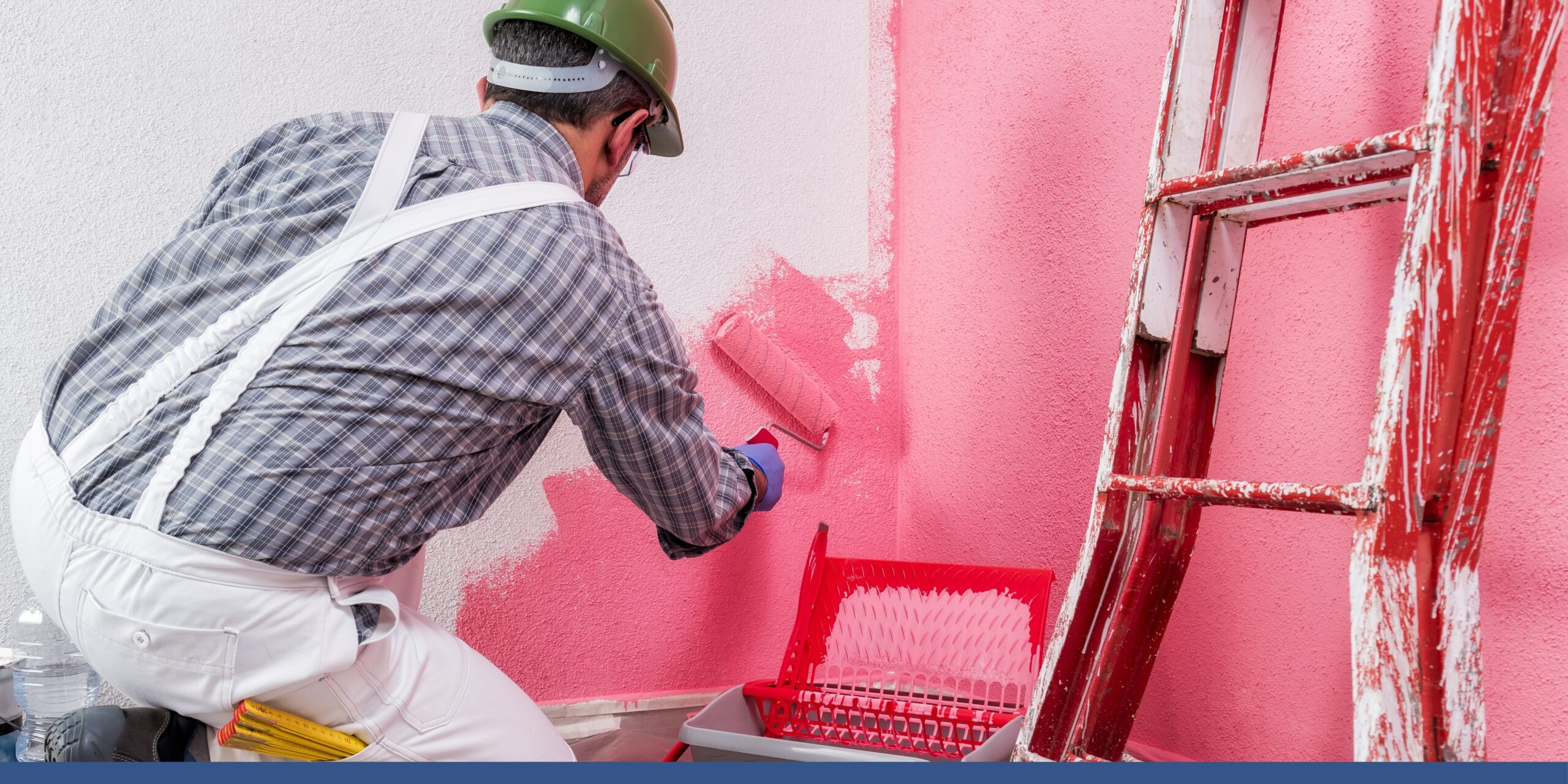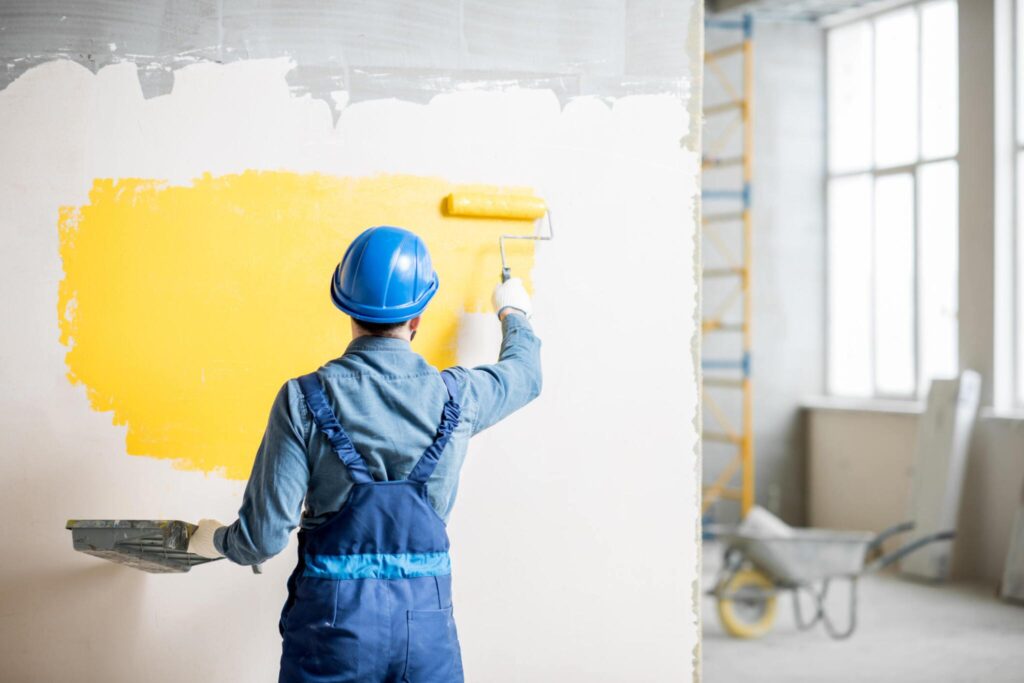Hiring painting contractors can be a pivotal decision when it comes to enhancing the aesthetics and value of your property. However, navigating the process can be challenging, especially if you’re unfamiliar with common pitfalls to avoid. Here are the frequent mistakes homeowners make when hiring painting contractors:
8 Common Mistakes When Hiring Painting Contractors
1. Failing to Verify References
It’s essential to ask for references from potential painting contractors and follow up on them. Speaking with previous clients can give you valuable insights into the contractor’s work quality, professionalism, and reliability. Skipping this step could lead to hiring a contractor with a history of unsatisfactory work or poor customer service. Review the contractor’s portfolio of past painting projects to assess their skill level, quality of work, and suitability for your project.
2. Opting for an Inexperienced Painter
Experience matters significantly in the painting industry. Hiring an inexperienced painter may result in subpar workmanship, delays, and unforeseen issues. Look for contractors with a proven track record and extensive experience in handling projects similar to yours to ensure a successful outcome.
3. Choosing the Most Inexpensive Contractor
While opting for the cheapest contractor to save money is tempting, this decision can backfire in the long run. A remarkably low bid may indicate shortcuts in materials, lack of proper insurance or licensing, or inexperienced workers. Instead of solely focusing on cost, prioritize value and quality to avoid potential headaches and costly repairs down the line.
4. Having No Communication
Effective communication is crucial for a successful painting project. Lack of communication between you and the contractor can lead to misunderstandings, delays, and dissatisfaction with the results. Maintain open lines of communication throughout the project, discussing timelines, expectations, and any concerns promptly to ensure a smooth and satisfactory experience for both parties.
5. Neglecting Insurance and Licensing Requirements
Always verify that the painting contractor holds the necessary licenses and insurance coverage before hiring them. Licensing demonstrates that the contractor meets industry standards and regulations, while insurance protects you from liability in case of accidents or property damage during the project. Neglecting these requirements could leave you vulnerable to legal and financial repercussions.
6. Not Securing a Written Contract
A written contract is essential to protect both you and the painting contractor. It should outline the scope of work, project timeline, payment schedule, and any warranties or guarantees offered. You risk misunderstandings, disputes, and difficulties enforcing agreements without a written contract. Always insist on a detailed written contract to safeguard your interests before work begins.
7. Paying in Full Before Job Completion
Paying the full amount before the painting job is completed is risky and could leave you vulnerable to unsatisfactory work or unfinished tasks. Instead, establish a payment schedule that includes a deposit upfront and subsequent payments upon reaching specific project milestones or upon satisfactory completion of the work. Holding a portion of the payment until the job is done ensures that the contractor remains motivated to deliver quality results and complete the project to your satisfaction.
8. Neglecting Post-Job Clean-Up Requests
A thorough post-job clean-up is essential to ensure your property is returned to its original condition after completing the painting project. However, neglecting to discuss clean-up expectations with the contractor beforehand could result in a messy and inconvenient aftermath. Communicate your expectations regarding cleaning and removing painting supplies, debris, and any mess created during the project to ensure a tidy and satisfactory conclusion.
How to Find Reliable Painting Contractors in Durham, CT
Finding reliable painting contractors in Durham, CT, is crucial for ensuring a successful and stress-free painting project. With numerous options available, knowing how to navigate the selection process effectively is essential.
Here are some key steps and considerations to identify reputable contractors who will deliver quality results tailored to your needs and preferences:
Seek Recommendations From Friends and Family
When looking for dependable painting contractors, starting with personal recommendations is beneficial. Here’s how you can leverage your network effectively:
- Tap into Your Network: Begin your search by asking friends, family, neighbors, and colleagues for recommendations, especially those recently hired painting contractors.
- Inquire About Experience: Ask them about their experience with the contractor, focusing on the quality of work, professionalism, and communication.
- Evaluate Satisfaction: Discuss their overall satisfaction with the services and any follow-up support they received.
- Note Specific Details: Pay attention to particular stories or details they share about their experiences, which can indicate the contractor’s suitability for your needs.
Look for Experience in Similar Projects
When evaluating painting contractors, prioritize those with relevant experience in projects similar to yours.
- Prioritize Relevant Projects: Ask about the contractor’s experience with similar scope, size, and complexity projects.
- Request Examples: Request examples or photos of their past work in similar projects for reference.
Request and Compare Multiple Quotes
To ensure you’re getting a fair price and comprehensive service package for your painting project, obtaining quotes from multiple contractors and comparing them carefully is essential.
- Provide Detailed Scope of Work: Furnish each contractor with comprehensive details about the project, including surfaces to be painted, desired colors and finishes, necessary preparations or repairs, and project timeline.
- Review Quotes Thoroughly: Examine each quote to understand cost breakdowns, encompassing labor, materials, and additional fees or expenses.
- Consider Overall Value: While the lowest bid may seem appealing, weigh factors like reputation, expertise, and customer reviews to determine the best choice.
Inquire About Materials and Techniques Used
The quality of materials and techniques used can significantly impact the outcome and longevity of your painting project. Here are some things to consider:
- Inquire About Materials and Techniques: During contractor interviews, ask about the types of paints, primers, finishes, and application methods they use, as well as their surface preparation techniques.
- Ensure Knowledge of Industry Standards: A reputable contractor should be well-versed in industry standards and best practices, recommending suitable materials and techniques tailored to your needs.
- Consider Environmental Impact: Inquire about eco-friendly or low-VOC options if concerned about indoor air quality or environmental impact.
Request References From Previous Clients
Before making a final decision, ask each painting contractor for a list of references from past clients who have had similar projects completed.
- Direct Communication with References: Contact these references to inquire about their experiences, including work quality, adherence to timelines, communication, and overall satisfaction.
- Ask Specific Questions: Uncover potential red flags or concerns by asking detailed questions about how the contractor addressed issues or concerns during the project.
- Value Real-World Feedback: Hearing from past clients offers valuable insights into the contractor’s work ethic and professionalism, aiding in making an informed decision.
Check for Membership in Professional Associations
Membership in reputable professional associations or trade organizations within the painting industry can be a positive indicator of a contractor’s commitment to excellence and adherence to industry standards. Here’s what to look for:
- Seek Membership in Professional Associations: Look for painting contractors affiliated with reputable industry organizations like the Painting and Decorating Contractors of America (PDCA) or local/regional trade associations in Durham, CT.
- Commitment to Excellence: Membership often signifies a commitment to professionalism, craftsmanship, and adherence to industry standards.
- Assurance of Quality and Reliability: Association criteria ensure contractors meet high standards, offering added assurance of quality and reliability.
- Access to Benefits: Membership may provide access to training, resources, and networking opportunities beneficial for both the contractor and their clients.

8 Benefits of Hiring Professional Painting Contractors
Hiring professional painting contractors offers numerous advantages that go beyond just applying a fresh coat of paint. These professionals bring expertise, experience, and efficiency to the table, ensuring a smooth and successful painting project from start to finish.
Some of its greatest benefits are:
1. High-Quality Workmanship
Professional painting contractors possess the skills, knowledge, and experience to deliver superior craftsmanship. From meticulous surface preparation to precise paint application, they ensure a flawless finish that enhances the aesthetic appeal and durability of your property.
2. Time Savings
Hiring professionals eliminates the need for DIY painting projects, saving you valuable time and effort. With their efficient workflows and team collaboration, painting contractors can complete projects swiftly while maintaining high standards of quality.
3. Expertise in Surface Preparation
Proper surface preparation is crucial for achieving long-lasting paint results. Professional contractors have expertise in assessing and addressing surface imperfections, such as cracks, peeling paint, or moisture damage, to ensure a smooth and durable paint application.
4. Access to Professional-Grade Equipment and Materials
Painting contractors have access to high-quality paints, primers, tools, and equipment that are not readily available to the average homeowner. By using professional-grade materials and specialized tools, they can achieve superior results and lasting finishes.
5. Improved Safety
Painting can involve working at heights, handling chemicals, and using power tools, posing potential safety risks for untrained individuals. Professional contractors adhere to strict safety protocols and regulations to protect themselves, your property, and occupants during the painting process.
6. Enhanced Property Value
A fresh coat of paint applied by professional contractors can significantly enhance the curb appeal and value of your property. Whether you’re planning to sell or simply want to refresh your home’s appearance, professional painting can make a significant impact on its overall value and attractiveness to potential buyers.
7. Customization Options and Advice
Professional painting contractors offer personalized advice and recommendations to help you achieve your desired aesthetic goals. Whether you’re selecting paint colors, finishes, or design elements, they can provide expert guidance and customization options tailored to your preferences and budget.
8. Peace of Mind
Hiring professional painting contractors provides peace of mind, knowing that your project is in capable hands. From initial consultation to project completion, you can trust that they will handle every aspect of the job with professionalism, integrity, and attention to detail, allowing you to relax and enjoy the transformation of your space.

7 Risks of Not Hiring a Painting Contractor for Your Home
Not hiring a painting contractor for your home poses several risks that can lead to dissatisfaction and costly consequences. Without professional expertise and experience, attempting a DIY paint job or hiring an inexperienced individual may result in:
1. Uneven Paint Application
Painting contractors are trained to apply paint evenly and smoothly, using proper techniques and tools. They know how to achieve consistent coverage without leaving streaks, drips, or patchiness on the walls. Without this expertise, DIY painters may struggle to achieve professional-looking results, leading to an unsightly finish that detracts from the overall appearance of the space.
2. Poor Surface Preparation
Surface preparation is a critical step in the painting process that involves cleaning, sanding, and priming the walls to ensure proper paint adhesion and durability. Without proper preparation, the paint may not adhere properly to the surface, resulting in peeling, cracking, or bubbling over time.
3. Inaccurate Color Selection
Choosing the right paint color can be challenging, as it requires consideration of factors such as lighting, room size, and design preferences. Professional painters can provide valuable guidance and expertise in selecting colors that complement the space and achieve the desired aesthetic.
They can also provide samples and test patches to help homeowners visualize how different colors will look in the room. Without professional advice, homeowners may struggle to choose the right colors and end up with a paint job that doesn’t meet their expectations.
4. Limited Access to Quality Materials
Professional painting contractors typically have access to a wide range of high-quality paints, primers, and tools that are not readily available to the average homeowner. By using inferior materials or cutting corners to save costs, unprofessional contractors may compromise the overall quality and longevity of the paint job, leading to premature wear and deterioration.
5. Safety Hazards
Painting involves various safety risks, including working at heights, handling chemicals, and using power tools. Without proper training and safety protocols, unprofessional contractors may put themselves and others at risk of accidents or injuries on your property. This not only jeopardizes the well-being of everyone involved but also exposes you to potential liability issues.
6. Longer Project Duration
Inexperienced or inefficient contractors may take longer to complete a painting project due to a lack of expertise, poor planning, or delays in obtaining materials. This prolonged duration can disrupt your daily routine and cause inconvenience, especially if the space being painted is a vital area of your home or business.
7. Voided Warranties
Some paint manufacturers offer warranties that require professional application according to specific guidelines. These warranties may cover issues such as peeling, cracking, or color fading, providing homeowners with added protection and peace of mind. However, if the paint job is not done by a professional or does not meet the manufacturer’s requirements, the warranty may be voided, leaving homeowners without recourse if problems arise.
Frequently Asked Questions
What is a painting contractor?
A painting contractor is a professional or company specializing in painting and decorating services. They possess expertise in various aspects of the painting process, including surface preparation, paint selection, application techniques, and finishing touches. Painting contractors typically offer services for residential and commercial properties, covering tasks such as interior painting, exterior painting, trim work, and specialty finishes.
How much do painting contractors charge on average?
On average, painting contractors may charge anywhere from $25 to $100 or more per hour for labor, with additional costs for materials, equipment, and overhead expenses.
What factors affect the cost of painting contractors?
Several factors influence the cost of hiring painting contractors, such as the size and complexity of the project, surface condition and preparation requirements, type of paint and materials used, and number of coats needed. It can also vary depending on the accessibility of the painting area, geographic location and local labor rates, additional services requested, and the contractor’s level of experience, reputation, and demand for services.
How long does it take for painting contractors to complete a project?
The duration of a painting project varies depending on factors like the size and complexity of the project, the number of coats required, the drying time between coats, necessary surface preparation or repairs, and any unforeseen issues. While smaller projects like a single room may be completed in a day or two, larger projects such as an entire house or commercial building may take several days or weeks to finish.
What type of paint is best for walls?
The best type of paint for walls depends on factors such as surface material, desired finish, and room usage. Common interior wall paint options include latex or acrylic paint (ideal for most interior walls and ceilings), oil-based paint (durable and suitable for high-traffic areas), matte or flat paint (hides imperfections well), satin or eggshell paint (offers a subtle sheen and easy cleaning), and semi-gloss or gloss paint (highly durable and washable, suitable for high-traffic areas and trim).
Transform Your Home with Custom Colonial Painting
Avoid common pitfalls by ensuring thorough vetting processes when hiring painting contractors. Experience the difference with Custom Colonial Painting, your premier Connecticut house painting contractor. With over 20 years of dedicated service and thousands of homes transformed statewide, our team of professional painters delivers superior results. Revitalize your space – choose Custom Colonial Painting today!



